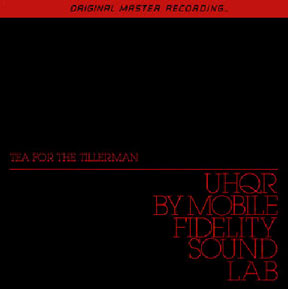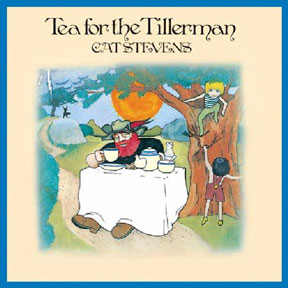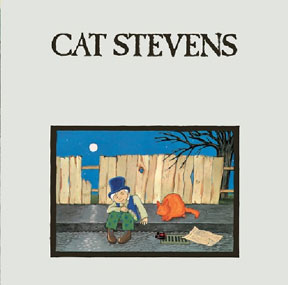Chad Kassem, founder of Acoustic Sound, has chosen Tea for the Tillerman as the very first title to be released from his new “Quality Record Pressings.” The ads for this new release got me to thinking about my love for Cat Steven’s music.
I’ve been a Cat Steven’s fan for 40 of the 57 years of my life. When I was 19 I put together my first high-end system: Quad 57s, Audio Research SP3, Quad II amps, and Sony’s top-of-the-line direct-drive turntable with a Decca International tonearm and a London Decca phono-cartridge. I remember going to Hillcrest High Fidelity in Dallas and going back to the high-end show room with Gene to pick the best sounding Decca. To do this we would put on Cat’s Tea for the Tillerman and drop the needle on cut four, “Sad Lisa”. Well anyway you get the idea; I both like and feel real nostalgia for Cat Stevens.
In the early 1970s his albums got more play time on my stereo than anyone. Tea for the Tillerman and Teaser and the Firecat both went triple platinum in the United States and his album Catch Bull at Four sold half a million copies in the first two weeks of release alone. Still, with all his popularity he had a rough life.
Cat Stevens, Yusuf Islam, or the name he was born with, Steven Demetre Georgiou, did not find life easy. He was a child of a Greek Orthodox father and a Swedish Lutheran mother, and was sent to a Catholic school. He developed an interest in music at a fairly young age, and taught himself piano using the family baby grand piano. With the popularity of rock music at age 15 he learned to play the guitar.
The musicians he said influenced him the most were Bob Dylan, Leadbelly, Paul Simon, Ira Gershwin, Leonard Bernstein, and Nina Simone. When I look at that list it become obvious to me why I love his music so much. In 1965 at the age of 17 he signed a publishing contract with Ardmore & Beechwood and cut several songs including “The First Cut Is the Deepest.”
He began to perform his songs in coffee houses and pubs. He chose the stage name Cat Stevens, in part because a girlfriend said he had eyes like a cat, but mainly because he couldn’t imagine anyone going to the record store and asking for ‘that Steven Demetre Georgiou album’. He recorded and toured with artists as diverse as Jimmy Hendrix, Engelbert Humperdinck, etc. His first hits were “I Love My Dog”, and “Matthew and Son”, the title song from his debut album.
Then at the age of 19, he became very ill with tuberculosis and had a lung collapse. He was near death when he got to the hospital. During this time Stevens began to question all aspects of his life, and spirituality. This hunt for spirituality can be clearly heard in his albums from the seventies.
In 1976, Stevens nearly drowned off the coast of Malibu. This second brush with mortality intensified his spiritual journey. He tested out Buddhism, Zen, I Ching, and Numerology to name a few. Then he begin to read the Qur’an and in 1977, he converted to Islam, taking the name Yusuf Islam in 1978 and pretty much disappeared from the world of popular music. I personally find it so sad that the Christian church he grew up in failed so in his time of need. Anyway, let’s look at this new release and a few more of Cat’s albums.
Tea for the Tillerman
QRP 200 gram LP
Produced by: Paul Samwell-Smith
Mastered by: George Marino at Sterling Sound, NYCTracks:
1. Where Do the Children Play?
2. Hard Headed Woman
3. Wild World
4. Sad Lisa
5. Miles From Nowhere
6. But I Might Die Tonight
7. Longer Boats
8. Into White
9. On The Road To Find Out
10. Father And Son
11. Tea For The Tillerman

On Acoustic Sound’s website they give a lot of details about finding the pristine original analog master tapes and how this reissue was done. If this technical information interest you, check it out. All you really need to know is that in every way this first effort from “QRP” is of the highest quality. Let’s just start with the gatefold packaging which looks just like the original, only better. As far as the sound goes it is equally brilliant. I compared it to a pink label Island copy I have had for years, I also have an A&M copy from back in 1971, the MoFi Japanese pressing and a 180 gram reissue, and the UHQR. Of these the original pink label from Island and the UHQR were by far the best, in my opinion.
Now we have a new contender from QRP and it is a strong contender indeed. Without a doubt it sounds more like the original than any of the others I have. And wow listening to this impeccably pressed on 200g vinyl reissue. The attack of the pick on the guitar strings is astonishingly clean and detailed. Depth is pronounced and because of both the blackness of the backdrop and the precision of both the state-of-the-art plating and the technological breakthroughs achieved in the retro-fitted presses, the resolution of low-level detail reveals a host of details that are either buried or glossed over on the other versions I’ve heard and own.By the comparison the UHQR sounds slightly more relaxed, maybe a little warmer, but they have one thing in common: there is no compression. The music is really dynamic and powerful. It would really be hard for me to say which is better. It seemed I liked whichever one I was listening to at the time. Of course if you don’t already own a copy of the UHQR this makes your decision easy, since a mint or sealed copy will cost you 5 to 10 times as much as a new copy of the QRP version.
If you own any other copy of this album except the original Island pink label or the UHQR, there is nothing that can touch it. Even if I owned the original, I would still purchase this new reissue; it is simply so transparent, so detailed, and best of all, so easy to listen to.
Teaser and the Firecat
Vinyl LPTracks:
1. The Wind
2. Ruby Love
3. If I Laugh
4. Changes IV
5. How Can I Tell You
6. Tuesday’s Dead
7. Morning Has Broken
8. Bitterblue
9. Moonshadow
10. Peace Train
Teaser and the Firecat is by far my favorite of Cat Stevens’s albums. It was released in 1971 and was an even bigger hit than his previous and most well know album, Tea for the Tillerman. What do I like so much about the album? Simple, the songs. Songs like Cat’s beautiful rendition of the Hymn “Morning Has Broken.” Then there’s the first song I ever heard played on a Quad 57 ESL speaker when I was 18 years old, “Bitterblue”, a cut I have judge the sound of stereos for 39 years. Another favorite of mine is “Tuesday’s Dead.” These are my favorite songs, but there are also the two more popular songs on the album, “Moonshadow” and “Peace Train.”
These are great ballads sung by my favorite singer, and what made it even better was how beautifully they were recorded. At one time this album and Tea for the Tillerman were both on Harry Pearson’s Super Disc list, that’s how good they sound. I need to be honest though; I loved Cat Stevens for the music. When I was in college, I listened to him everyday and this was my favorite album. Yes, there are some expensive versions from M&K and others, but you can usually find originals at places like Half-Price for less than $5.00.
Ysuf Roadsinger
1. Welcome Home
2. Thinking ‘Bout You
3. Everytime I Dream
4. The Rain
5. World O’ Darkness
6. Be What You Must
7. This Glass World
8. Roadsinger
9. All Kinds of Roses
10. Dream On (Until…)
11. Shamsia
I wanted to end this article by sharing with you the first album that let me hear Cat Stevens’ voice singing new music in years. With Roadsinger Yusuf, I was brought back to those years of hearing Cat Stevens albums for the first time. This record is Yusef/Cat Stevens at his best. Like most of the Cat Stevens albums of the seventies, the recording quality is excellent. With that natural and warm sound, it makes me feel like I’m listening to Cat Stevens again. I find it remarkable that his voice and style has stayed so much from where it was in his twenties. I found myself drawn in and listened to it from start to finish. In case you are too young or missed him the first time around, or like me who always loved his music, don’t miss Roadsinger.
- (Page 1 of 1)


